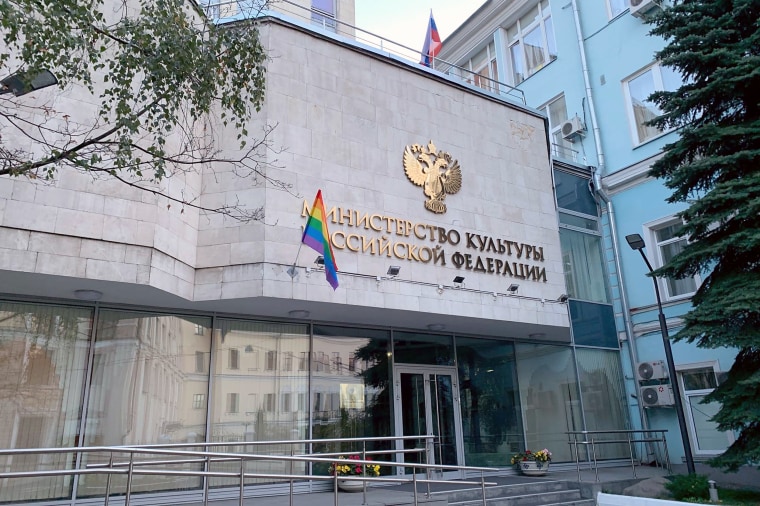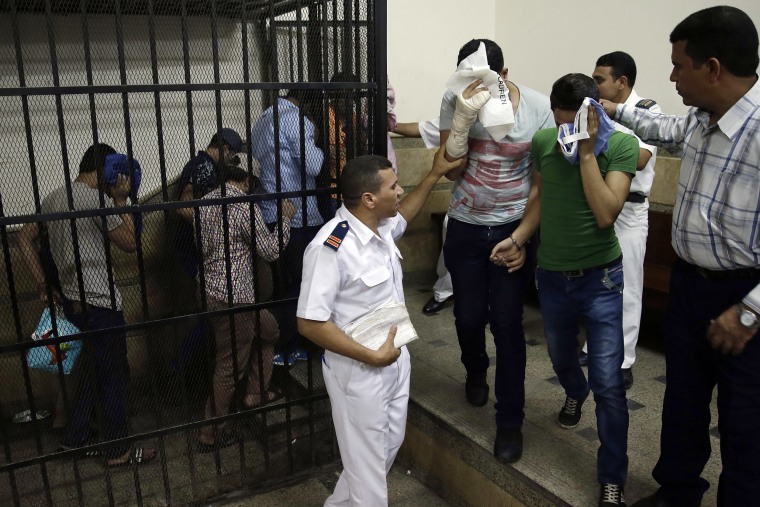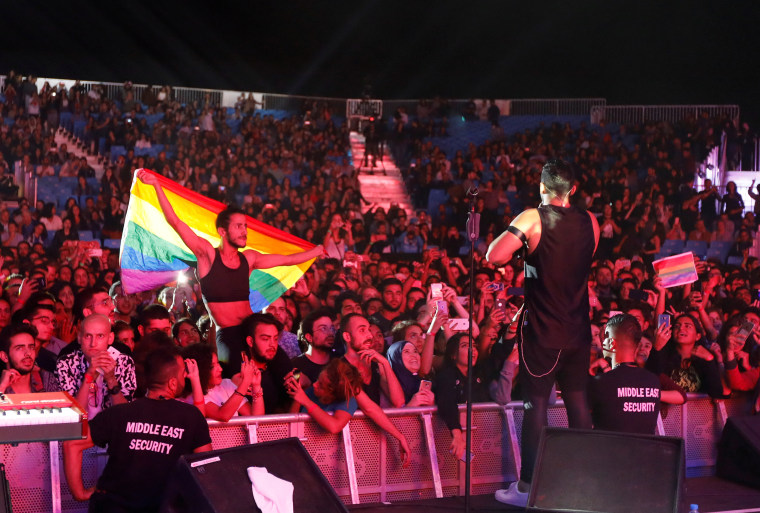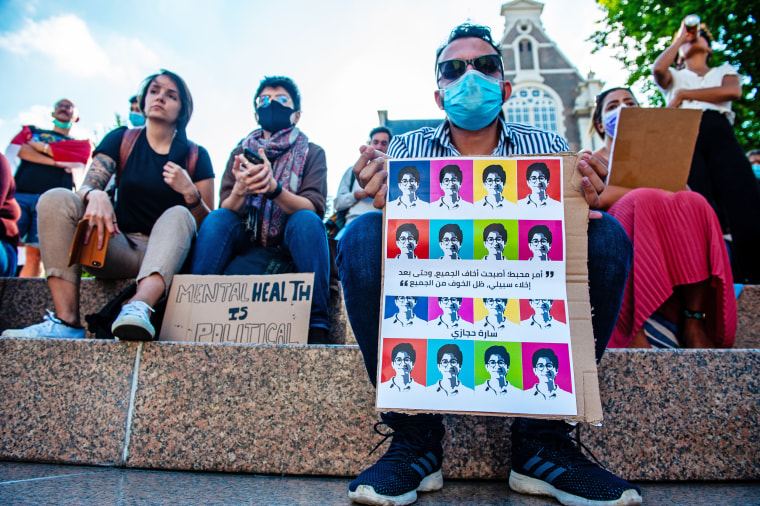TAIPEI, Taiwan — An estimated 130,000 people attended Taiwan LGBT Pride on Saturday, making it the world’s biggest in-person celebration of gay rights since the pandemic began.

The high turnout reinforced Taiwan’s image as a beacon of gay rights in Asia and one of the world’s safest places in the coronavirus era.
“I feel that Taiwan has really set an example, to be able to have a normal life and also to continue with this Pride event even though the world is not able to come this year,” said Eve Teo, 34, who lives in Taipei

In a year in which many global gay pride events have been canceled or moved online, Taiwan’s parade kicked off from outside Taipei City Hall, as scheduled, on the last Saturday in October.
Organizers said they expected it to be the biggest Pride event to take place this year since the World Health Organization declared a global pandemic in March.
The event was a colorful testament to Taiwan’s successful control of the coronavirus. The island of 24 million people has seen just 554 confirmed Covid-19 cases, including seven deaths, and no lockdowns. Taiwan’s last locally transmitted infection was recorded in April
.
Louise Watt Image: Pride parade in Taipei (Louise Watt / for NBC News)
 ©Louise Watt Image: Pride parade in Taipei (Louise Watt / for NBC News)
©Louise Watt Image: Pride parade in Taipei (Louise Watt / for NBC News)Organizers asked participants to wear masks, although many didn’t. Wearing a mask was Chen Yen-shuo, 25, who held up a sign offering “free hugs.” The software engineer from Taichung said the pandemic wasn’t stopping people from “Taiwan just legalized same-sex marriage last year, and there still hasn’t been a second country in Asia to do so, so I think this parade is really important for Asia,” Liu said. “We first reached the milestone, and we can help others to march forward and take the next step, and make more people in Asia care about this aspect of human rights.”Democratic Taiwan is a trailblazer for gay rights in Asia. In May last year, it became the first — and still only — place in Asia to legalize same-sex marriage. Since then, more than 4,000 same-sex couples have tied the knot in Taiwan.
On Friday, two gay couples were, for the first time, among dozens taking part in the Taiwan army’s annual mass wedding ceremony. The army posted on Facebook wedding photos of the couples, and those of the two female soldiers and their civilian partners by far received the most likes from the public.
“You defend our country, we defend your freedom,” read one comment.
Last year, organizers estimated 200,000 people marched to celebrate Taiwan’s legalization of same-sex marriage. This year, fewer people could travel from elsewhere in Asia to attend the event because Taiwan’s borders are closed to tourists. Anyone who does enter must self-isolate for 14 days.
Liu Chun-chieh, 34, who works in e-commerce and was dressed as a Greek warrior, said the event was important for the region at large.
Even though gay men and women have the right to marry in Taiwan, activists say discriminatory attitudes still need to change as well as the law. In one example, a Taiwanese person can only marry a foreigner of the same sex if same-sex marriage is also legal in the foreigner’s home country. In addition to Taiwan, only 28 countries around the world allow same-sex marriage.
As the government’s measures to stop the spread of Covid-19 have included barring the entry of many foreigners, this has meant some same-sex couples have been forced apart this year.
Among those unable to marry in Taiwan are Olivia Wu and her partner Eve Teo, who is from Singapore, where a law banning consensual sex between men is still on the books.

“Singapore hasn’t legalized same-sex marriage, so us deciding to live here in Taiwan, that has really affected us,” said Wu, a Taiwanese American from Los Angeles. The couple were marching with Wu’s parents.
“As a community, we’re still very proud and obviously happy that Taiwan is the only country that recognizes this, but we just feel like there’s that part where we’re not complete yet,” Wu, 35, said.
Activists are also fighting for equal adoption and assisted-reproduction rights. At the moment, Taiwan’s law only allows for married same-sex couples to adopt children who are biologically related to one of the partners. Reese Li, secretary general of Taiwan LGBT Family Rights Advocacy, said there were at least 300 LGBTQ families in Taiwan who had adopted children or had assisted reproduction abroad.

Chi Chia-wei, an activist who had been campaigning for marriage equality in Taiwan since the 1980s, said this year’s parade was less about protest, and more about education regarding LGBTQ issues and equality.
“In schools, they don’t teach children that after same-sex marriage is passed, there will be a lot of LGBT families,” he said. “They don’t let children understand this, and so there needs to be more effort to strengthen this.”
At the entrance to Taipei’s Pride march on Saturday, Pearl Jain and Lance Xie held up a sign offering free hugs. Similar placards were waved above the pulsating crowd of 100,000 sweaty and bedazzled party goers crushedalong the parade route.
Xie had recently returned from Melbourne, where 5 million people have just emerged from one of the toughest lockdowns in the world and everyone is trying not to touch each other. It was good to be home.
Jain said: “It’s nice to have the chance to hug people here because everywhere else is in lockdown and that’s just so sad.”
People in Taiwan are still taking precautions – mandatory masks on public transport, digital registration for some events, isolation for people with symptoms – but Jain said life in Taipei had barely changed in 2020. “We’re doing really great, our government and people here are just trying to protect ourselves,” she said.
Saturday was Taiwan’s 202nd consecutive day without a single locally transmitted case, and for the tens of thousands out celebrating the LGBTQ+ community, Covid feels like a distant memory.
Taiwan, a self-governing democracy of 24 million dangerously close to mainland China, where the virus began, has essentially eliminated community transmission of Covid-19 after recording just 550 mostly imported cases and seven deaths.
Amid a global downturn, Taiwan’s GDP is predicted to grow by more than 1.5% this year. In the third quarter it grew by 3.3% – the fastest since 2018. The only other government claiming growth is China, which considers Taiwan to be a breakaway province that it must take back – by force or otherwise.
Even though people are quite divided on political issues, when we face a common threat people want to work together Professor Yawen Cheng
“In Taiwan, even though people are quite divided on political issues, when we face a common threat, people want to come together and work together,” Yawen Cheng, professor of health policy at the National Taiwan University, told the Observer.
After the 2004 Sars epidemic killed 73 of its people, Taiwan strengthened and centralised its disease control framework and pandemic preparations, and started annual drills. Taiwan also learned from that epidemic that it couldn’t rely on bodies like the World Health Organization (WHO) for timely information, because China had ensured the country’s exclusion from global briefings and emergency meetings.
“We couldn’t get direct information from international organisations,” said Cheng. “Taiwan has always been careful about what happens in mainland China, so the Central Epidemic Command Centre (CECC) of Taiwan tried to get information from informal channels.”
When Taiwan’s authorities received a social media message in late December warning of a strange pneumonia outbreak in Wuhan, they acted almost immediately, screening flights from the Chinese city before enacting entry bans, which were eventually extended to all foreigners by March. Strict border controls are still in place, and around 340,000 people have gone through the mandated quarantine for new arrivals, monitored by the CECC and police, and tracked by mobile phones.
The government also banned mask exports while it stockpiled and then rationed them out to residents as local production increased tenfold. The health system was scaled up and new technologies developed to monitor, track and trace potential cases, and to support people with grocery deliveries and counselling.
Audrey Tang, Taiwan’s digital minister, said the most important technologies in the Covid response were masks and soap, but technology played an “assistive role”. This included the development of a mask availability map using pharmacy supply and sales data, and “digital fencing” – using phone tracking to allow people to quarantine at home. When a signal leaves the property or drops out, a call is made to the police.

The measures “piggyback” on existing technology – such as mobile phone mast triangulation and SMS warning systems for earthquakes – to alert people to infection risks nearby, said Tang, a former civic hacker and well-known advocate of open democracy. They don’t collect any data they weren’t collecting pre-pandemic, Tang added.
Other countries have balked at proposals far less intrusive than those that Taiwanese people accept. Cheng said there had been a lot of discussion about whether the state had gone too far but acknowledged that it had been responsive to concerns.
In a policy study published in October, Cheng and her co-author suggested the Taiwanese government’s landslide election win in January gave it the political capital to maximise its response, and perhaps even to overreact. “I think social trust is the key to the success of Taiwan’s virus control,” she said. “It’s an interactive process. The government has done a lot to make the information more public and open, and so in turn the public trust the government’s actions.”
Taiwanese society was not unchanged by the pandemic. While Taiwan’s tech exports rose in a world full of people stuck at home with their devices, the local economy suffered. The Taiwanese government has passed financial measures worth billions of pounds.
Tang said habits formed in the early months, like contactless payments and online food deliveries, boosted e-commerce but hurt sectors that rely on face-to-face interaction. In response, the government launched a programme selling NT$3,000 (£80) shopping vouchers for $1,000.
“That rebuilt the habits of spending outside of one’s home, and rebuilt the economy based on face-to-face transactions, like night markets,” Tang said.
Now, Taipei’s shops and markets are heaving. People browse, busk and greet each other with handshakes and hugs. It feels normal.
Tang said the government’s willingness to listen to expertise outside its inner circle was key. It helped that the vice president at the time of the outbreak was Chen Chien-jen, an epidemiologist, but there was also “a larger culture that says we trust the wisdom at the edges and the frontline”.
Back at the parade, the afternoon sun bounced off the blue sequins of Diva Wei’s ballgown as she and Daniel Lin waited to start marching, something they were conscious was open to few others around the world.
“I feel this is the marvellous outcome of our government’s policy and the collaboration from society,” said Lin. “It’s so great.”
Taiwan has staged its gay pride rally, 200 days free of local coronavirus infections. Some 130,000 celebrated the island nation’s vanguard role on same-sex in Asia, but this year’s turnout was smaller.

Rainbow-masked revelers paraded through Taiwan's capital, Taipei, Saturday, celebrating equality gains since it allowed same-sex marriages last year, despite objections from religious conservatives.
President Tsai Ing-wen, re-elected to a second term last January, urged the country via social media Saturday to embrace "love, tolerance and a better Taiwan.”
The mingling went ahead after 200 days in a row without a single recorded local infection, thanks to Taiwan's early 2020 response that saw arrivals from rival China and other origins tested and quarantined, limiting Taiwan's toll to 7 deaths.
Asian Gay Games host next year
Drag queen Qu Po-sung wore a red banquet dress at Saturday's parade and vowed to attend "all of my friends' weddings as the rally wound through Taipei, which next year is due to host Asia's Gay Games.
Read more: Taiwan parliament approves gay marriage bill
Since Taiwan legalized same-sex marriages in May 2019, more than 4,000 couples have registered nuptials, including two women military officers married Friday.
One restriction is that a foreign partner must come from a country with gay law. And, on same-sex parenting, Taiwanese remains divided.
Rights vanguard role
Taiwan, though, is seen as the vanguard of a burgeoning movement in Asia for LGBT (lesbian, gay, bisexual and transvestite) rights.
Read more: Taiwan military marries LGBT+ couples for first time
"Taiwan is Asia's first,” said Chien Chi-chieh, secretary general of the Taiwan Alliance to Promote Civil Partnerships Rights.
"That makes us proud,” added Chen Wei-chun, a bank employee. "Taiwan has done a fantastic job at both equality and pandemic control.”
ipj/rc (Reuters, AFP)
















